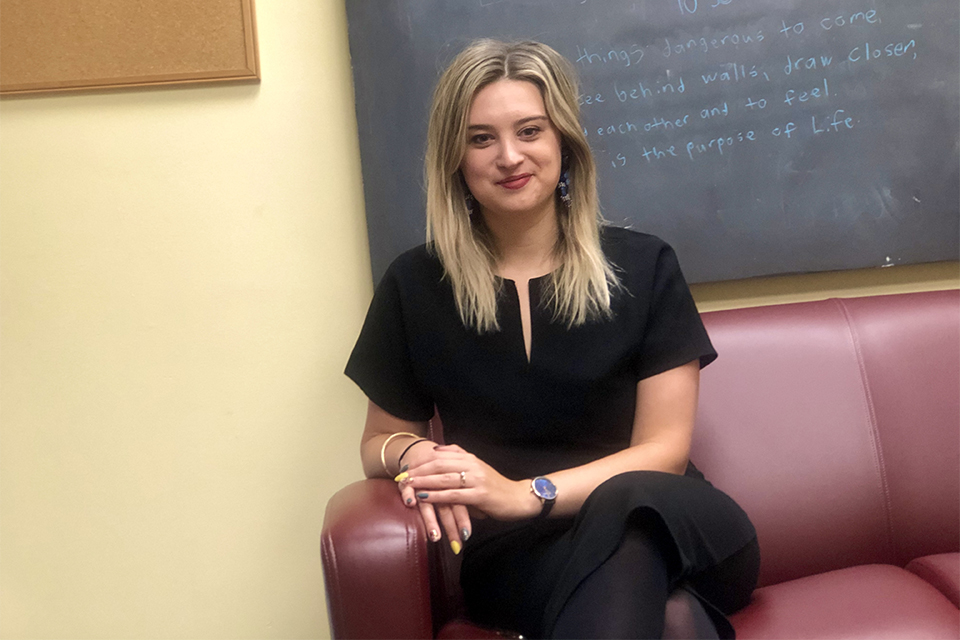Diana Filar
This summer (2020), with the support of the Mellon Connected PhD grant, I had to opportunity to intern at  the International Institute of New England, IINE, a nonprofit focused on immigrant and refugee resettlement, education, career advancement, and citizenship. As a Grants and Research Writing Intern, I was primarily responsible for assisting in the preparation of grant applications and for organizing the internal grant database.
the International Institute of New England, IINE, a nonprofit focused on immigrant and refugee resettlement, education, career advancement, and citizenship. As a Grants and Research Writing Intern, I was primarily responsible for assisting in the preparation of grant applications and for organizing the internal grant database.
One of the best parts of this internship was that the staff at IINE was committed to helping me meet my personal goals in addition to the work I did that benefitted the organization. I started the summer really learning the ins and outs of the organization and their programs, and in July, I had the opportunity to work on two grants that were submitted for two different realms of funding. For the first, I did research on Diversity, Equity, and Inclusion (DEI) trainings for both employees and clients. As an added bonus, I saw an overlap between my doctoral research on comparative racialization within immigrant communities and the research for this grant, in that it became clear that educating new immigrants about the racial dynamics in the US were of the utmost importance for their understanding and integration into their new communities. I was also assigned as the lead point person/writer for a grant to secure funding for IINE’s English for Education (EFE) programming, which provides year-round language classes.
Because IINE has so many programs for immigrants across its 3 sites (Boston, Lowell, and Manchester, NH), I quickly realized I had a lot of questions about how everything worked. This knowledge about programming was necessary to write grants and organize previous funding, and I had to become comfortable asking a lot of questions. As I worked with the team on the two grants mentioned above, I also gained experience bouncing ideas off others and writing collaboratively, something that isn’t necessarily common in the humanities side of academia. In addition to knowledge about the programs at IINE specifically, I also learned about nonprofits more generally.While I was an intern, the company expanded the development team, which works closely with the grants and contracts department (where I was). Both arms are needed in order to secure funding for the organization and keep the vital programs in operation.
The most unique aspect of this experience was probably interning during the COVID-19 pandemic. Not only did this affect how my internship was conducted (online only), it also meant the grants team had to pivot quickly and effectively to apply for and secure funding for immigrants and refugees undergoing financial hardship due to the pandemic. Because the US government suspended refugee arrivals and resettlement to the US during the time of my internship, this meant the organization had to assess how best to serve the existing community, and prepare for when the borders reopened. I researched several funding opportunities related to COVID and also included information about the impact on immigrant communities and communities of color in the grants I helped write.
This project contributed to my professional development in several ways. While I was already familiar with writing on deadlines as a PhD student, nonprofit grant funding deadlines have tighter turnaround times. Dissertation writing is usually a pretty long-term solitary affair, but at the internship, new grants were due every week, and I had to retrieve information and data from different people in the company (e.g., the programs director, the data analyst, and the CFO) in order to meet deadlines. I also learned a lot about nonprofit finances and structure. While I expected to have some conversations about money since I knew I would be applying for grants, I didn’t realize I would gain so much information about the inner workings, how funding gets distributed, and how the programs function within those constraints. Finally, I greatly enjoyed working with my incredible coworkers and supervisors and being a part of a collaborative environment.